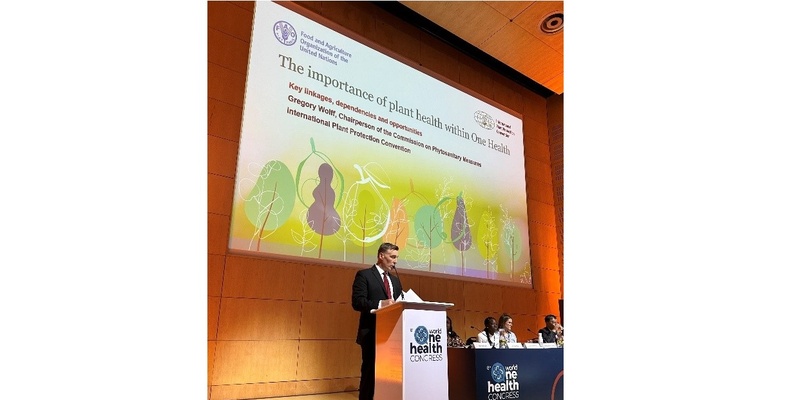Plant health is planet health. CPM Chair urges integration of plant health in One Health during global One Health Congress
Posted on Vie, 20 Sep 2024, 10:00

©Courtesy
Cape Town, 20 September 2024. Plant health is vital to support the One Health framework, which addresses the prevention, control, and management of diseases impacting humans, animals, and the environment, and is intended to improve the health and wellbeing of all concerned. Plants form the base of the food chain for humans and animals, providing 80 percent of our food and 98 percent of our oxygen. However, pests and diseases threaten plant health, causing 40 percent of global crop loss annually, exacerbated by climate change. The interconnection between plants, animals and humans is clear, and One Health actors should raise the profile of plant health and consider it more actively in One Health.
This was the key message by Gregory Wolff, Chairperson of the Commission on Phytosanitary Measures (CPM), the IPPC’s main governing body, who represented the IPPC at the 8th World One Health Congress held from 20 - 23 September 2024 in Cape Town, South Africa. He delivered a keynote lecture titled Healthy Plants, Healthy Life, emphasizing the importance of plants and the environment in One Health. He underlined the crucial role of plant health in achieving the Sustainable Development Goals by 2030 and emphasized the IPPC’s commitment to helping countries develop and implement International Standards for Phytosanitary Measures, with provisions for appropriate actions to prevent entry and spread of plant pests.
Wolff noted that at its eighteenth session in 2024, CPM emphasized the role of plant health in One Health and supported the IPPC’s more active involvement and engagement in the One Health discourse. As part of this work, Contracting Parties tasked the IPPC Secretariat with investigating the nature and scope of risks associated with antimicrobial resistance in plant health, including resistance to antibiotics and fungicides. This ongoing work aims to contribute positively to the overall One Health objective.
The IPPC also contributes to One Health by setting international plant health standards and promoting compliance with them to reduce the impact of plant pests and diseases on human, animal, and environmental health. “The IPPC also continues to analyze the impact of climate change on plant health, collecting scientific evidence and generating the tools necessary to safeguard against pest outbreaks such as fall armyworm and banana fusarium wilt which devastate important staple food crops.
One Health and the UN Pact for the Future
The 8th World One Health Congress brought together One Health stakeholders, including science researchers, policymakers, representatives of international organizations, civil society, and the private sector to discuss major One Health challenges, research, and policy developments across sectors and disciplines. The Congress was organized with support from the quadripartite collaboration on One Health, comprising the Food and Agriculture Organization of the United Nations (FAO), the United Nations Environment Programme (UNEP), the World Health Organization (WHO), and the World Organization for Animal Health (WOAH).
The One Health Commission, the global One Health Community, and participants at the World One Health Congress called for the inclusion of One Health in the outcome of the United Nations Summit of the Future, the Pact for the Future. They proposed a clause recognizing the interconnectedness of human, animal, plant, and ecosystem health as vital for achieving the Sustainable Development Goals.
The Congress also had a session on “Linkages between One Health and Plant Health”. During the session, Wolff highlighted linkages and opportunities for integrating plant health in One Health, including addressing toxins and carcinogens produced by plant pathogens, collaborating on research on shared disease transmission factors, cross-referencing research and integrating and harmonizing training, detection, diagnostics, response, and control mechanisms.
At the plant health session, Jan Hendrik Venter, CPM Bureau representative for Africa and Director of Plant Health in the Ministry of Agriculture, Land Reform and Rural Development, South Africa, addressed the impact of plant pests on human and animal health in Africa, while Xueping Zhou, Director General of the Institute of Plant Protection at the Chinese Academy of Agricultural Sciences presented on the role of plant health for food security in China.
Related information

